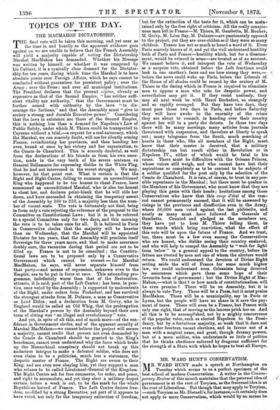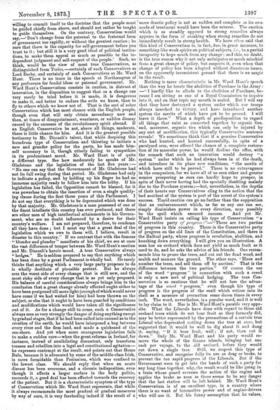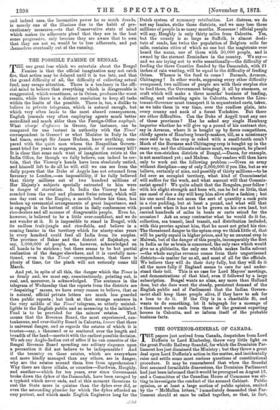MR. WARD HUNT'S CONSERVATISM.
N1H. WARD HUNT made a speech at Northampton on Tuesday which seems to us a perfect specimen of the best school of modern Conservatism. A writer in the Contem- porary Review of this month maintains that the paternal idea of government is at the root of Toryism, as the fraternal idea is at the root of Liberalism. But though that may apply to Toryism, ŌĆösuch Toryism as Mr. Disraeli's, for instance,ŌĆöit certainly does not apply to mere Conservatism, which would by no means be
willing to commit itself to the doctrine that the people must be guided chiefly from above, and should not rather be taught to guide themselves. On the contrary, Conservatism would say,ŌĆö'Don't change from the paternal to the fraternal form of government too rapidly, or without the greatest caution ; be sure that there is the capacity for self-government before you trust to it ; but still it is a very good ideal of political institu- tions, to make them appeal as much as possible to the in- dependent judgment and self-respect of the people.' Such, we think, would be the view of most true Conservatives, as distinguished from Tories,ŌĆöcertainly of such Conservatives as Lord Derby, and certainly of such Conservatives as Mr. Ward Hunt. There is no trace in the speech at Northampton of any preference for feudal ideas or paternal government. Mr. Ward Hunt's Conservatism consists in caution, in distrust of innovation, in the disposition to suggest that as a change can very rarely be tried before it is made, it is dangerous to make it, and better to endure the evils we know, than to fly to others which we know not of. That is the sort of sober Conservatism which has most chance with the English people, though even that will only obtain ascendancy now and then, at times of disappointment, weariness, or sudden dismay caused by the excesses of the revolutionary spirit abroad. If an English Conservative be not, above all things, moderate, there is little chance for him. And it is the greatest possible testimony to Mr. Disraeli's talent, that while despising this humdrum type of Conservatism and thirsting to initiate a new and grander policy for the party, he has made him- self necessary to it, though utterly failing to sympathise in its predominant mood. Mr. Ward Hunt is of quite a different type. See how moderately he speaks of Mr. Gladstone and the legislation of the last five years :ŌĆö "No one can say that the Government of Mr. Gladstone had not its full swing during that period. Mr. Gladstone had only to indicate a policy, and by holding up his finger he had an immense majority ready to follow him into the lobby. If his legislation has failed, the Opposition cannot be blamed, for it was powerless to obtain the insertion of even a single qualify- ing clause during the first three years of this Parliament. I do not say that everything is to be deprecated which was done by that majority. Mr. Gladstone is a man possessed of one of the finest intellects this country has ever produced, and there are other men of high intellectual attainments in his Govern- ment, who are no doubt influenced by a desire for their country's welfare. I am not prepared, therefore, to condemn all they have done ; but I must say that a great deal of the legislation which we owe to them will, I believe, result in disaster to this country." If we contrast that with the famous "blunder and plunder" manifesto of his chief, we see at once the vast difference of temper between Mr. Ward Hunt's caution and Mr. Disraeli's heroic mood. A true Conservative always "hedges." He is seldom prepared to say that anything which has been done by a great Parliament is wholly bad. He rarely thinks that anything which a very large party proposes to do is wholly destitute of plausible pretext. But he always sees the worst side of every change that is still new, and the most risky side of every change that is as yet only proposed. His balance of careful considerations always brings him to the conclusion that a great change already effected ought either to have been postponed till more light (enough of which would never have come if we had waited for him) had been thrown on the subject, or else that it ought to have been guarded by conditions and modifications which would have taken all the significance out of it. As for a change still to come, such a Conservative always sees so very strongly the danger of doing anything except bygradual stages, that if he had been called into counsel as to the creation of the earth, he would have interposed a bog between every river and the firm land, and made a quicksand of the sea-shore. And yet when more courageous legislation fails to make a sudden cureŌĆöwhen the great reforms in Ireland, for instance, instead of annihilating discontent, only transform treason and rebellion into a legal and constitutional agitationŌĆö he expresses contempt at the result, and points out that Home Rule, because it is advocated by some of the middle-class Irish, is more formidable than Fenianism, which was confined to the lowest class. We should reply that when an acute disease has been overcome, and a chronic indisposition, even though it affects a larger surface in the body politic, succeeds it, a good deal has been effected towards the recovery of the patient. But it is a characteristic symptom of the type of Conservatism which Mr. Ward Hunt represents, that while it always recommends the most gradual of gradual measures by way of cure, it is very foreboding indeed if the result of a
more drastic policy is not as sudden and complete as its own mode of treatment would have been the reverse. The caution which is so steadily opposed to strong remedies always appears in the form of croaking when strong remedies do not immediately result in strong health. We have often said that this kind of Conservatism is, in fact, due, in great measure, to something like weak spirits on political subjects, i.e., to a partial incapacity to hope much from any change ; and this, no doubt, is the true reason why it not only anticipates so much mischief from a great change of policy, but suspects it, even when that change of policy has been adopted without disastrous issues, on the apparently inconsistent ground that there is no magic in the result.
Nothing is more characteristic in Mr. Ward Hunt's speech than the way he treats the abolition of Purchase in the Army : ŌĆö"I hardly like to allude to the abolition of Purchase, be- cause I am sitting as one of a Royal Commission to inquire into it, and on that topic my mouth is sealed. But I will say that they have destroyed a system under which our troops always marched to victory, and have introduced another system the merits of which have got to be proved. I will leave it there." What a depth of predisposition to regard all things that exist as connected together by organic ties, and, moreover, organic ties which can only be injured by any sort of modification, this typically Conservative sentence reveals! We sometimes think that if a genuine Conservative who had hunted, and hunted successfully, in spite of a paralysed arm, were offered the chance of a complete restora- tion of its muscular power, he would decline the offer, with the remark that such an innovation would destroy "a system" under which he had always been in at the death, and introduce in its place new conditions, "the merits of which have still to be proved." There is no extravagance in the comparison, for we have all of us seen other and greater armies prospering as ours can hardly hope to prosper, in spite of their never having had the specially disabling malady due to the Purchase system ;ŌĆöbut, nevertheless, in the depths of their hearts our Conservatives cling to the notion that the bad accident of the system is part of the secret of the system's success. Timid caution can go no further than the supposition that an embarrassment which, as far as any one can see, simply diminishes power in every direction, may possibly
be the spell which ensured success. And yet Mr. Ward Hunt insists on calling his type of Conservatism "a Conservative party of progress :"ŌĆö" There are two parties of progress in this country. There is the Conservative party of progress on the old lines of the Constitution, and there is the Radical party, whose progress is revolution, abolition, and knocking down everything. I will give you an illustration. A
man has an orchard which does not yield as much fruit as it used to do, and he asks the advice of his friends. One recom- mends him to prune the trees, and cut out the dead wood, and mulch and manure the ground. The other says, Blaze and number the trees, and sell them off by auction.' That is the difference between the two parties." Of course the use of the word " progress " in connection with such a creed is only a new sort of political hedging. The true Con- servative is so cautious that he will not lose the advan-
tage of the word "progress," even though his type of progress is the progress of the snail which retires into its
shell as a measure of precaution some dozen times in every inch. The word, nevertheless, is a popular word, and it is well to lay claim to it. Nor is Mr. Ward Hunt's parable very appo- site. What the Liberals have done with regard to those old orchard trees which do not bear fruit as they formerly did, may be better represented by the precautions of a certain true Liberal who deprecated cutting down the tree at once, but suggested that it would be well to dig about it and dung it, saying, "If it bear fruit, well ; if not, then cut it down." Only Mr. Ward Hunt and his party would re- move the whole of the Guano islands, bringing but one cask per voyage, to the ,old orchard, before they would cut down a single tree. Still, we respect this type of Conservative, and recognise fully its use as drag or brake, to prevent the too rapid progress of the Liberals. But if the Government were to get into the hands of such a party for any long time together, why, the result would be like going in a train whose guard reverses the action of the engine and applies the brake as soon as there seems to be any danger that the last station will be left behind. Mr. Ward Hunt's Conservatism is of an excellent type, in a country where there is no want of locomotive power and of engine-drivers who will use it. But his funny assumption that he values, and indeed uses, the locomotive power he so much dreads, is merely one of the illusions due to the habit of pre- cautionary measares,ŌĆöto that Conservative state of mind which makes its adherents plead that they are in the best sense progressive, only because they are aware that to own that they are not so, would be to lose adherents, and put 'uhemselves eventually out of the running.




































 Previous page
Previous page